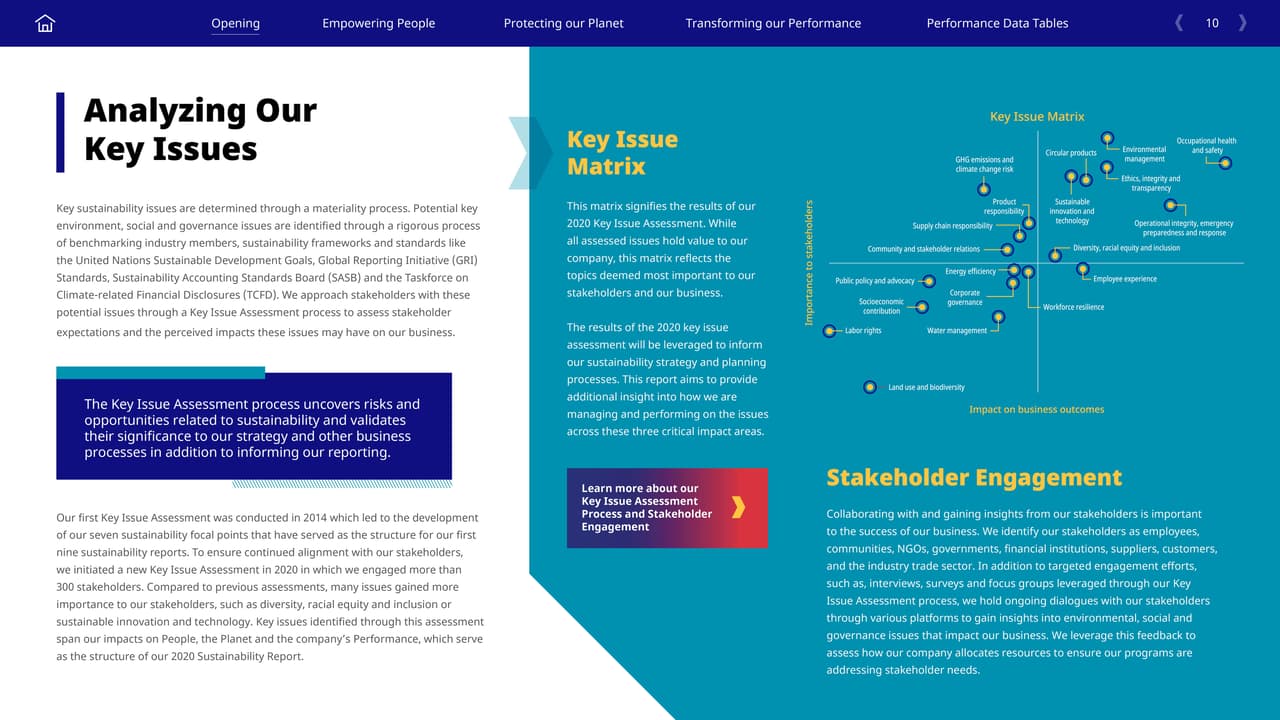The Key Issue Assessment process uncovers risks and opportunities related to sustainability and validates their significance to our strategy and other business processes in addition to informing our reporting.



Analyzing Our
Key Issues
Key sustainability issues are determined through a materiality process. Potential key environment, social and governance issues are identified through a rigorous process of benchmarking industry members, sustainability frameworks, and standards like the United Nations Sustainable Development Goals, Global Reporting Initiative (GRI) Standards, Sustainability Accounting Standards Board (SASB) and Task Force on Climate-Related Financial Disclosures (TCFD). We approach stakeholders with these potential issues through a Key Issue Assessment process to assess stakeholder expectations and the perceived impacts these issues may have on our business.
This matrix signifies the results of our 2020 Key Issue Assessment. The results will be leveraged to inform our sustainability strategy and planning processes. This report aims to provide additional insight into how we are managing and performing on the issues.
All assessed issues are important to CPChem. This matrix reflects only those topics deemed most significant to our stakeholders and our business. The arrangement of issues within the matrix is the result of a detailed scoring exercise based on raw stakeholder rankings.
Collaborating with and gaining insights from our stakeholders is important to the success of our business. We identify our stakeholders as employees, communities, NGOs, governments, financial institutions, suppliers, customers and the industry trade sector. In addition to targeted engagement efforts, such as interviews, surveys and focus groups leveraged through our Key Issue Assessment process, we hold ongoing dialogues with our stakeholders through various platforms to gain insights into environmental, social and governance issues that impact our business. We leverage this feedback to assess how our company allocates resources to ensure our programs are addressing stakeholder needs.
Our first Key Issue Assessment was conducted in 2014, which led to the development of our seven sustainability focal points that have served as the structure for our first nine sustainability reports. To ensure continued alignment with our stakeholders, we initiated a new Key Issue Assessment in 2020, in which we engaged more than 300 stakeholders. Compared to previous assessments, many issues gained importance to our stakeholders, including diversity, racial equity and inclusion, and sustainable innovation and technology. Key issues identified through this assessment span our impacts on People, the Planet and the company’s Performance, which serve as the structure of our 2020 Sustainability Report.

Key Issue
Matrix
Stakeholder Engagement



10


